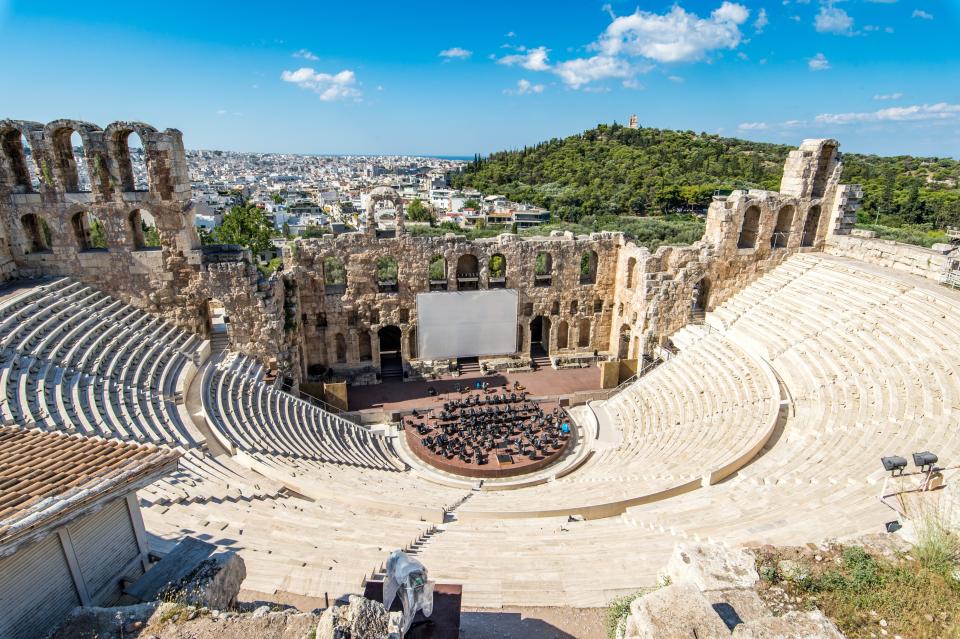Florence and the Machine Will End Their Tour at a Seriously Monumental Athens Venue
Each year, roughly 2 million people visit the ancient Acropolis in Athens. In the summer months, tourists climb the rocks and ruins of the historic hilltop with the searing hot sun beating down on them, all to take in the slightly crumbling but still magnificent marble structures and the sweeping view of the cityscape juxtaposed with the countryside beyond. These tourists are allowed to look, but not to touch. The masses must adhere strictly to designated pathways, with security guards on hand to ensure no one leaves anything behind, and absolutely no one is allowed inside the centerpiece of it all, the Parthenon.
But there is one structure on the hill that is used today as it was in ancient times: The Odeon of Herodes Atticus, or the Herodion Theatre, as it is commonly called. The 4,300-seat, semicircular venue was completed in 174 A.D. by Herodes Atticus, who built it for his late wife, Aspasia Annia Regilla, using stones for the three-story front wall and timber for the roof. It was reduced to ruins in 268 A.D. by an attack from the Heruli, an East Germanic tribe. The structure was excavated during the 1860s, and in the 1950s, the stands and stage were fully refurbished using pentelic marble.
Since 1955, the theater has been the site of the Athens and Epidaurus Festival, which runs from May through October every year with various Greek and international performances, as well as other productions throughout the year. The lineup skews classical (Andrea Bocelli, Yanni, and the Bolshoi Ballet have all performed; Yo-Yo Ma is slated for this summer), with only a handful of radio-friendly performers granted permission to add this venue to their tours. Over the years this has included people like Frank Sinatra, Sting, Elton John, Diana Ross, Liza Minnelli, Patti Smith, and the Foo Fighters—and earlier this month, Florence and the Machine announced that they’d be joining this elite group, wrapping up their High as Hope tour with a show at the Herodion on September 19.

2019 Governors Ball Music Festival - Day 2
“The Conservatory of Herodes Atticus may be temporarily granted for events of only high aesthetic and artistic value, consistent with the character of the monument as a Conservatory,” archaeologist Sophia Moschonisioti tells Architectural Digest. Artists must receive approval from Greece’s Central Archaeological Council and the Department of Prehistoric and Classical Antiquities and Museums at the Hellenic Ministry of Culture and Sports in order to perform in the space, and they must pay fees, which these organizations use to maintain the monument.
Stavros Striligas, the communications manager of media relations for Detox Events, the promoter for this concert, informs Architectural Digest that the planning process for the show began in 2018, and noted that it isn’t easy for “big rock" acts like Florence and the Machine to play at the Herodion. The band’s frontwoman, Florence Welch, “made it clear that she really wanted to finish her current tour at Herodion,” says Striligas. “It took us more time than we thought it would, but in the end, the permission was granted.” During the application process, “you have to justify why the particular artist should be allowed to perform at the venue and then you wait for their decision,” he says.

Odeon of Herodes Atticus theatre structure.
“Grecian art and mythology have always played a huge part in my work, so I cannot think of a better place for the final show of this record,” said Welch in a release at the time of the announcement. And indeed, her love of Greek mythology and culture has been well documented. In a 2015 interview with Vice, Welch said she was “obsessed with the Odyssey and the Iliad,” and revealed that the band’s album How Big, How Blue, How Beautiful was almost entitled “Tantalus,” after a Greek mythological figure. “Tantalus was cursed by the gods to stand in a pool of water under a fruit tree, so he could see the fruit, but he was never able to get it and he could see the water, but never be able to drink it. And for me, that concept was very present in the record in that I could see this thing that I wanted and I just couldn’t reach it,” she explained. In 2016, she released a short film comprising music videos from the album entitled The Odyssey.
Welch’s manager, Hannah Giannoulis, tells Architectural Digest that concertgoers can expect Welch to revisit these ideas during the September concert. "The set design will be as minimal as possible to highlight the beauty of the venue,” says Giannoulis. “Greek mythology has played a big part in Florence's songwriting, so I would imagine those songs will make an appearance. Florence is honored to be granted the opportunity to perform her last concert on this album in such a magical place."
Originally Appeared on Architectural Digest

